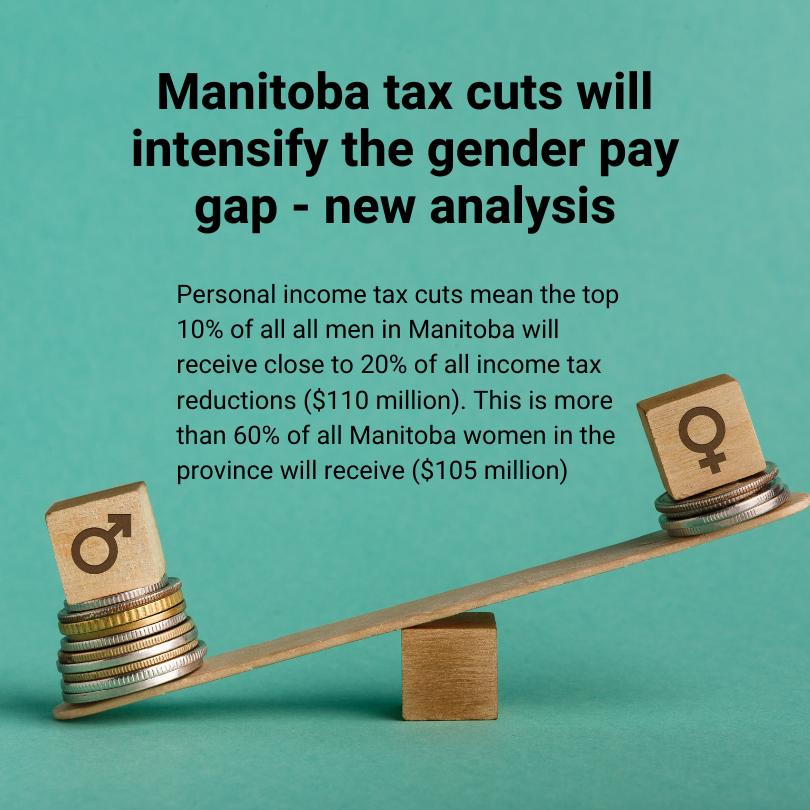
March 8, 2024
For Immediate Release (Winnipeg Treaty One).
On International Women’s Day and with a new Manitoba budget set to be released on April 2, 2024, the Canadian Centre for Policy Alternatives (CCPA) Manitoba is releasing a new analysis on the effects of personal income tax cuts first announced in Budget 2023/24 on gender-based income inequality in Manitoba. The research was done using Statistics Canada SPSD/M tax simulation software. The results paint a stark picture of increasing gender-based income inequality.
Overall, the analysis finds that the top 10% of all men in Manitoba will receive close to 20% of all income tax reductions ($110 million). These men will receive more tax savings than 60% of all Manitoba women (the bottom 6 deciles of women will receive $105 million), and more than 40% of all Manitobans.
Tax cuts will intensify the gender pay gap in Manitoba
A gender analysis of Budget 2023/24 income tax cuts demonstrates that these cuts will increase gender-based income inequality in Manitoba.
In total, men will receive 57.7% of income tax reductions in 2024, while women will take home 42.3% (See Table 1). Please note that Statistics Canada income tax data does not incorporate a broader definition of gender, and therefore, data on gender-diverse individuals was not available.
The biggest discrepancies emerge when income tax cuts are broken down by income decile.
The two columns to the far left of Table 1 show that the richest, 10th decile of male earners will take home 19.3% of all income tax reductions. This is more than all women with taxable incomes below $51,000 (60% of women) and all Manitobans with taxable income below $34,600 (40% of Manitobans).
Table 1: 2024 tax cuts by decile for men and women in Manitoba
Source: Statistics Canada SPSD/M 29.0 and author’s calculations
The persistence of a gender pay gap in Manitoba explains why the tax cuts disproportionately benefit men over women. In Manitoba, women and gender-diverse people are less represented in high-paying jobs due to systemic discrimination. As a result, fewer women are present in the highest income decile in Manitoba, which receives the maximum income tax cut. By giving back the largest tax cuts to high-income men, the 2023 income tax cuts will exacerbate gender-based income inequality in Manitoba.
The Statistics Canada income tax data used to analyze tax reductions for women versus men did not include sufficient information on race to produce statistics on how these changes will affect race-based income inequality. However, previous CCPA research shows that the gender pay gap is larger for racialized women. Fewer racialized women will receive the maximum income tax reductions compared to white women or men, once again intensifying race-based income inequality.
Background
In the last Spring Budget, the Manitoba government put forth $495 million in personal income tax cuts.
This included raising Manitoba’s Basic Personal Amount from $10,145 to $15,000 and raising income tax brackets.
The impacts of these tax cuts have proven to be highly unequal.
When CCPA economists ran the numbers on taxable incomes in Manitoba, considering all other tax credits and benefits, Manitoba’s top 10% of tax filers will receive a whopping 26% of all benefits, totalling $132 million. The top 20% receive 42% of savings. The bottom half of Manitobans (making under $43,000) receive only 24% of savings.
For individuals with taxable income over $101,300 per year the average reduction will be $1,322 in 2024. For anyone with taxable income below the median ($43,000), the average benefit will be $237.
Media contacts: Molly McCracken, 204-803-0047 molly@policyalternatives.ca
-30 –


